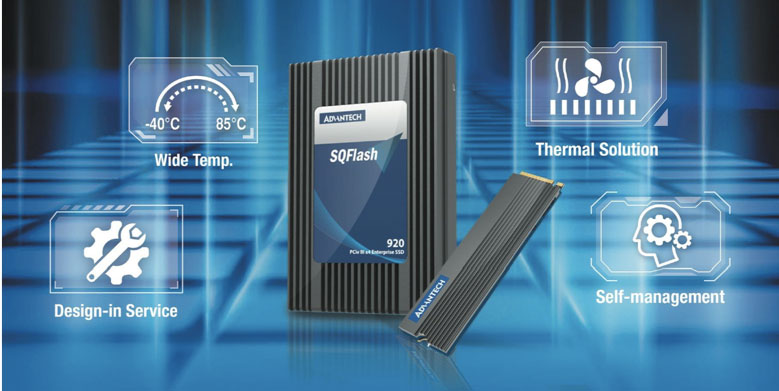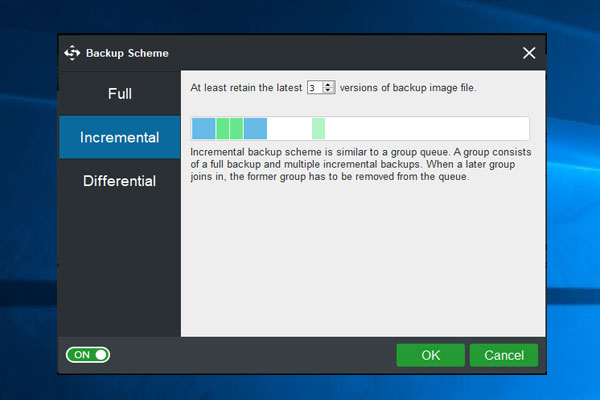Do you know Advantech's SQFlash SSD? It can store high volumes of vision-based data efficiently. Read this post to know its features. It is very suitable for in-vehicle applications like surveillance, in-vehicle data logging, auto-piloting, etc.
The Increasing Demands for Storing High Volumes of Vision-Based Data
From surveillance and factory automation to artificial intelligence (AI) applications, the demand for efficiently storing high volumes of vision-based data is growing rapidly.
Statistics MRC, a market research firm, believes the global industrial machine vision market will expand from $8.54 billion in 2017 to $16.89 billion by 2026. At the same time, Allied Market Research predicts that the global automotive camera market will reach $24.1 billion by 2025 with an annual growth of almost 10%.
In AI field, there has been an increase of applications using machine learning, which need to analyze high volumes of vision-based data. These applications require reliable, high-capacity, high-performance storage.
In transport field application aspect, there has been a technology improvement in surveillance, in-vehicle data logging, auto-piloting, etc. For example, there is still a distance from a fully self-driving car, but many luxury, top-of-the-line cars will offer self-parking features, which is realized by combining edge technology with sensors, visual data storage, and AI.
Applications applied in transport field also require reliable, high-capacity, high-performance storage, because such systems may need to operate in challenging environments with wide temperature ranges, strong vibration levels, considerable humidity, or unstable power supplies.
For instance, a UPS truck driver may drive for hours on end in the middle of a freezing winter night; or, a car sits in traffic in the middle of downtown Los Angeles in sweltering summer heat. Then, the storage device should adapt to these environments.
Apart from the above environments, there are many other challenging environments to which the storage device should adapt, for example, a manufacturing facility, the body of a vehicle or aircraft, or outdoors.
In these situations, SSDs built on non-volatile NAND flash memory are preferred. However, there may be issues when deploying SSDs in industrial or ‘non-consumer’ applications. Apart from NAND flash performance, reliability and endurance may decrease as storage density increases.
In a word, as technology improves for transport field applications like surveillance, in-vehicle data logging, and auto-piloting, there is a significant and growing demand for efficiently storing high volumes of vision-based data. And all of these applications require reliable, high-capacity, high-performance storage. This is a challenge.
Advantech’s SQFlash SSDs
Facing the above challenges, Advantech, a global leading provider of the industrial flash storage, presents its solution – SQFlash 920 NVMe SSDs. This SSD series brings high performance, high density, and full function storage security support. It also allows complete design-in service for industrial applications.
SQFlash 920 NVMe SSDs use Toshiba’s BiCS 3D NAND flash technology, support capacity of up to 8 TB per drive, and come with built-in smart thermal management and comprehensive security features.

Thermal Management
Compared with NVMe SSD using only thermal throttling, the SQFlash 920 NVMe SSD thermal management can reduce internal temperatures by up to 10 degree celsius to bring superior performance.
In addition, SQFlash 920 series uses thermal grease with outstanding mechanical flexibility to avoid the risk of physical damage to SSD components upon abrupt temperature changes.
Furthermore, real time thermal data from SSD internal thermal sensors can be provided for embedded system controllers through PCIe or SMBus to manage smart fans and active cooling that can directly target the SSD.
Security Features
SQFlash 920 NVMe SSDs also contain many security features. Here are some of them.
- Power Failure Protection: The controller will stop all memory activity to prevent invalid data being written or accessed when the voltage drops below 2.9V. Once power is restored, a data integrity check will assess data validity and take corrective action to eliminate the possibility of incorrect data caused by a non-complete write to flash.
- Power Drop Catcher: In many industrial scenarios, even a power drop of less than 1ms can impact read/write functionality or cause devices to freeze. Power Drop Catcher, an embedded reset IC, can constrain reset timing to handle the glitches caused by voltage drops.
- Flush Manager: DRAM is usually deployed to act as a cache between the controller and the storage so that the SSD performance and endurance can be ensured. When power failure or unstable power supply occurs, Flush Manager will ensure data integrity by making sure that the valid data is only stored in the flash memory and not the cache.
- Voltage Stabilizer: This function will maintain a stable power supply to both the flash memory and the DRAM cache when the built-in voltage detector detects unstable power supply (below 4.75 V or above 5.25 V).
Apart from the above functions, SQFlash 920 NVMe SSD also applies other methods to ensure data security. For example, SQFlash 920 NVMe SSDs come with Advantech’s patented security feature: “Flash Lock”, which enables the SSD to bond with the mainboard automatically when needed. It helps in protecting data from unauthorized access.
In addition, SQFlash 920 NVMe SSDs incorporate anti-virus functions from McAfee by default, which can protect the system from virus and malware attacks.
SQFlash 920 NVMe SSD is the first industrial market oriented NVMe SSD designed for rugged environments like aerospace, in-vehicle, or defense applications.



User Comments :